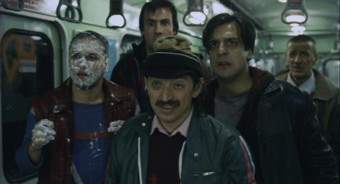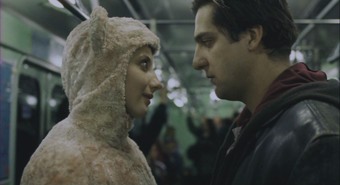|
There's
something very appealing and appropriate about the subway
system as an outsider film location, an underworld where those who do not fit in or have rejected the values
of the community above can theoretically feel at home. Geographically speaking, it's a subsection of society
in which small pockets of precariously maintained civilisation
are connected by a large network of dark tunnels that
could house just about anything, areas into which no
sane person would venture without the protection of
a big metal underground train. In a very old series
of Dr. Who, one that really creeped
me out as a child, the London Underground system had
long since been abandoned and become home to roaming
bands of Yeti. Wait a minute, what the hell was a mythical
Himalayan beast doing wandering around the Tube? It
didn't matter to me at the time – it merely confirmed
what I, as a youngster who was irregularly taken on said
underground system believed was unquestionably true,
that those tunnels housed a dark and dangerous threat.
In
1972 this was confirmed by Gary Sherman's Death
Line, a fascinatingly creepy tale of cannibals
living in deserted areas of the London Underground.
Marc Singer's remarkable Dark
Days documented a community of homeless
New Yorkers who had created a shanty town in the city's
subway tunnels, and the idea of as subterranean social
group was the basis for Luc Besson's offbeat and entertaining Subway in 1985. And now we have Nimród
Antal's Kontroll, an imaginative, hugely
entertaining blend of the dramatic, the comedic and
the delightfully oddball, filmed and set entirely in
the Budapest underground system.
The
story revolves around Bulcsú, one of a gang of
misfit ticket inspectors – known as control officers
– who are held in low regard even by their fellow officials
and especially by their grouchy supervisor. Their daily
confrontations with uncooperative or downright aggressive
passengers are further aggravated by a running battle
with a young fare-dodger named Bootsie, and a mysterious
hooded figure who is throwing passengers in front of
moving trains.

One
of the problems I have with leading characters of many
Hollywood films is that even those in the most grubby
and punishing jobs rarely look like the people who actually
carry out these tasks in the real world, but good-looking actors pretending
to be them, a situation increasingly evident in UK TV
drama as well. Say what you like about Eastenders, but the cast look exactly
like the people they portray. This is the
only trait the programme shares with Eastern European
cinema – there's not a face in Kontroll that
doesn't look like it has wandered in from the back streets
of Budapest, and the film is all the better for it.
Hollywood relies on the recognition factor for character
engagement – oh look, it's Tom Cruise, I know him, therefore
I know the character – but in Kontroll you engage with the characters in part because the faces
so perfectly fit. You feel you know them precisely because,
in a way, you do – you've met them, worked with them,
are related to them. Perhaps you even are them.
It
helps, of course, that they are genuinely funny people,
or at least funny to us – collectively they hold a somewhat negative
world view, the result in part of working in a thankless
job that offers the thin illusion of power to those
who would otherwise never command it. Their authority
is tenuous at best – unlike their British counterparts,
the Budapest controllers are identified only by a simple
armband pulled over their regular clothes, their slovenly
attitude and scruffy appearance making it all too easy
for those they confront to ignore, argue with or even
attack them. It is these very confrontations that provide
some of the funniest moments, and if a couple of these
groan under the weight of painful stereotyping – the
smiling, camera wielding Japanese family, the outrageously
camp and predatory gay – others are inventive
and wittily handled, and in one case involving a syringe
and a saw, borderline surreal.
Character
introductions are particularly well handled. Bulcsú,
for example, we are at first misled into believing is
a vagrant. Waking up on a station platform with a nosebleed
and angrily confronting a passing passenger, it is only
when he brings the man to a halt that he identifies
himself to him and to us as a controller. This technique of comic misdirection
is also used on Béla, whose early morning drinking
prompts him to almost set fire to his eyebrows when
trying to light a cigarette, something the station announcer
then admonishes him over the tannoy system for. Swigging from a bottle, he
then staggers over to a train and unexpectedly steps
into the driver's cabin. And then there's Bulcsú's
motley crew, who in a single long take are wonderfully
sketched – loutish, narcoleptic Muki, cynically world-weary
Professor, diminutive but irritable Lecsó, and
eager new boy Tibi, who is there, of course, to ask
questions on our behalf and provide a window to the
various character and narrative back stories.
The
first half is played primarily for laughs, but the film
moves into more dramatic territory as the story progresses.
Thus a grisly early scene in which the remains of
a victim of the hooded killer are scooped into bags
is more comic than horrific – "I never thought
there were worse jobs than ours" remarks Bulcsú
thoughtfully as one of the medics charged with this
unfortunate job (played by Gábor Herendi, a noted
director in his own right) trots out recipe details
to his glum companion – while the later scene in which
the neurotic Laci holds a knife to the throat of a passenger
who assaulted him is considerably darker in tone. Even the controllers'
early high-speed foot pursuit of the mischievous
Bootsie is energetically light-hearted, and while Bulcsú's
later confrontation with him starts in comedic fashion
– his attempt to cockily pull on his armband falters
when he can't remember what pocket it's in – it does
not end that way, and moves the film into its final
act, where the dramatic starts to give way to the
metaphoric.

Third
time out director Nimród Antal handles both the
comedy and action with considerable aplomb, switching almost invisibly between the static camera of
the ensemble scenes, hand-held montage sequences of
the controllers at work and the fast cut mobile camerawork
of the chases. The comedy springs not just from character
but from the audience's familiarity with oft-used cinematic
sequences. As the controllers set out to work, strutting
down the platform like wayward Reservoir Dogs and accompanied
by Neo's effective
butr largely unmemorable techno score, they position themselves at the platform's
edge ready to leap into action, only to have the train
they are waiting for overshoot its mark, which puts
the music on pause while the train edges back to
its correct position. That Antal also provides a witty
link to an earlier sequence is typical of his planning
and attention to detail. Even when the drama takes over,
the comedy makes a nicely timed return in a wonderfully
edited montage in which the controllers visit the company
psychiatrist, a sequence that accelerates to
such a manic speed that the final stages are simply
impossible to subtitle.
Dramatically,
the film is enjoyable enough, but in the end it's the
richly detailed characters and sometimes laugh-out-loud
comedy that you remember it most for, and which gives
it an appeal that stomps merrily through national boundaries.
This may be the first we in the UK have heard of 32-year-old
newcomer Antal, but I have a sneaking suspicion it won't
be the last.
Framed
1.85:1 and anamorphically enhanced, this is a largely
impressive transfer given that the film was shot on location
in the Budapest underground using what looks very much
like available light, resulting in a sometimes very
narrow depth of field and muted colour. It's a look that is emphasised by
the deliberately drab costumes, all of which gives the visuals a
slightly (and appropriately) grubby look, which was
pretty much how it played in the cinema. Sharpness and
contrast are otherwise very good (with a couple of slightly
greyed-out exceptions), and compression artefacts, though
occasionally visible, are never intrusive.
The
English subtitles are clear and grammatically sound,
with only a couple of incorrect words betraying their non-UK
origin. The menus are very classily done, and could
teach most UK releases a lesson in how to present a
movie on DVD.
There
are three Hungarian soundtracks available: 2 channel
stereo, 5.1 and DTS surround. There's no real contest here –
despite the strengths of the 5.1 track, the DTS is far
and away the best, having a fine dynamic range, excellent
separation and some very nice lower frequency work.
The stereo track is considerably inferior to both.
Oh,
to be able to speak Hungarian. This single disc Hungarian
region 0 release is also available as a 2 disk set, but
it seems very unlikely that the extras on the second disk
would be subtitled in English. On this single disk version
there is only one real extra, though this could very well
be priceless....if you can speak the language: a commentary
track by 'The Five Control Officers', or
at least the actors who play them. This sounds a very
lively and fun track – there is a fair amount of laughter
and lively chatter, but not speaking the lingo I
was unable to follow what is being said. The track is
not subtitled, but I would hope that any company planning
a release either here or in the US would pay
someone to do a translation, as this sounds like a great
deal of fun.
Also
included here is a trailer for the second
disk (1:37), rubbing your nose it
in a bit by showing you what you're missing if you only
have the single disk version. Included are video biographies,
storyboard comparisons, what looks like deleted scenes,
a featurette on Neo and the creation of the music, filmographies
and a fair amount more.
It
should be noted that the version included on this Hungarian
DVD includes – like the version shown at international
film festivals but not in UK cinemas – an introduction
by Aba Botond, the director of the Budapest Metro, in
which he ensures us that his employees do not behave as
depicted in the film and says how pleased he was to help
this young and upcoming film director.
At
the time of writing Kontroll is still
not available on DVD in the UK. Apparently ICA are to
release a disk in April, but given their past history
of sub-standard, non-anamorphic transfers and scant extras
I am not exactly holding my breath. At present this is
the one to go for, and can be ordered via the Hungarian
DVD store Numero7 for about £15. Particularly impressive is that the
disk itself is packaged in a paper sleeve inside the plastic
case, which effectively prevents it coming loose and getting
scratched, something that has happened a few too many
times to me. Nice one.
I
would still love to see some enterprising UK or US distributor
get that commentary track subtitled. Kontroll is an inventive and enormously entertaining comedy-drama-thriller
with a great cast, a lovely line in humour and the sort
of snappy handling that marks Nimrod Antal as a talent
to watch. Highly recommended.
|